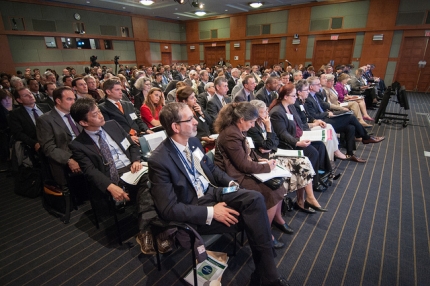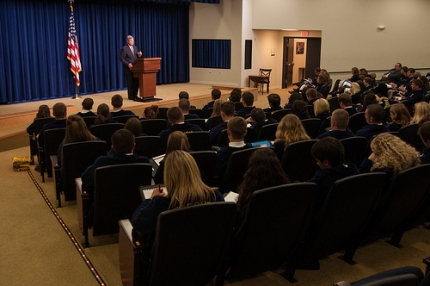Related Rural Blog Posts
Media Round-up: White House Report on Fixing our Broken Immigration System
Posted by on July 30, 2013 at 4:18 PM EDTYesterday, the White House released a report that provides further evidence that commonsense, bipartisan immigration reform would provide economic benefits for our nation’s agriculture sector, our workforce, and rural communities. The report highlights the strong growth states’ agriculture sectors have seen in recent years and underscores how that growth can support other parts of our economy – especially in rural communities focused on agricultural development. In fact, in many of these communities, a temporary worker program and an earned path to citizenship will boost farm output and produce other positive spillover effects. Coupled with a decline in native-born rural populations, the strength and continuity of rural America is contingent on commonsense immigration reform that improves job opportunity, provides local governments with the tools they need to succeed, and increases economic growth.
In June, the Senate passed historic legislation that is largely consistent with the President’s principles for commonsense immigration reform with a strong bipartisan vote. This bill would strengthen border security, while providing an earned path to citizenship for undocumented farmworkers who are vital to our nation’s agriculture industry, and a new temporary worker program negotiated by major grower associations and farmworker groups. If enacted, the Senate bill would result in undocumented workers paying a fine, their full share of taxes and is estimated to allow an estimated 1.5 million agricultural workers and their dependents to earn legal status. A diverse group of stakeholders know this: it’s a major reason why they are calling on the House to join the Senate in acting to fix our broken immigration system in a way that requires responsibility from everyone — both from workers here illegally and from those who hire them—and guarantees that everyone is playing by the same rules.
FFA State Presidents ‘Suit Up’ for Agriculture
Posted by on July 25, 2013 at 6:53 PM EDTEd Note: Yesterday, Secretary Vilsack had the opportunity to speak with some of our nation’s brightest young leaders at the National FFA Organization’s State Presidents’ Conference. He discussed USDA’s efforts to revitalize the rural economy and recognized the officers for their commitment to leadership, personal growth and career success. Below is a blog post submitted to USDA by Clay Sapp, 2012-13 National FFA President. You can find the original post here.
This week is the National FFA Organization’s 2013 State Presidents’ Conference (SPC) in Washington, D.C. At SPC, state FFA officers are exposed to new ideas, meet new people and expand their perspectives as they sharpen their advocacy skills for tomorrow. Two officers from each state, Puerto Rico and the Virgin Islands are represented at this year’s conference, which carries the theme, “Suit up.”
At SPC, state officers undergo intense leadership training and develop a solid understanding of partner relationships. Their training is used to gather grassroots student input from across the nation on the future of FFA and agriculture education.
On Wednesday, our state officers were able to learn about key issues facing rural America, agriculture and education during a White House Rural Council meeting. We heard from U.S. Secretary of Agriculture Tom Vilsack, U.S. Secretary of Education Arne Duncan, executive director of Let’s Move and senior policy advisor on nutrition Sam Kass and senior policy advisor for rural affairs Doug McKalip.
Learn more about RuralSupporting Military Readiness and Training through Environmental Conservation
Posted by on July 17, 2013 at 2:43 PM EDTLast week, the Obama Administration announced a new federal, local, and private sector collaboration that will preserve agricultural lands and restore and protect wildlife habitat, all while helping to sustain military readiness.
Known as the “Sentinel Landscapes” partnership, the effort is kicking off with a pilot at Joint Base Lewis-McChord, an important training facility for our troops in the South Puget Sound region of Washington State, and home to some of the last remaining native prairie habitat for wildlife in the state.
This unique convergence of landscapes comes with unique challenges. Namely, as development comes closer and closer to the base, at-risk species in the area take refuge in the only land that can’t be developed, the military base itself. The presence of these species can then bring restrictions to the base’s ability to engage in certain training activities.
In a unique collaboration, the U.S. Department of Agriculture, the U.S. Department of Interior, and the Department of Defense will work together and with private landowners and state and local partners, including the non-profit Center for Natural Lands Management, to preserve and restore habitat around the base to ensure at-risk species can survive, while also improving military readiness by ensuring training activities can proceed unimpeded.
Building Community Leaders for Regional Success
Posted by on July 12, 2013 at 11:36 AM EDTEd. note: This is cross-posted from the Delta Regional Authority.
Strong leaders are integral to the success of Rural America, binding together neighbors, sustaining the deeply rooted culture, and searching for ways to keep the community moving forward. To ensure a future generation of Delta leaders, the Delta Regional Authority, a member of the White House Rural Council, began the Delta Leadership Institute Executive Academy.
Founded in 2005, the first Executive Academy class convened 22 people from the eight states of the Delta region to learn about the most pressing economic and social issues facing Rural America and collaborate to find common solutions to address these problems. Through leadership development sessions, communication trainings, case studies of successful models of change, and exposure to fellow community members and other parts of the region, the Executive Academy has created a corps of community leaders who have a vision for the Delta as a regional unit. The Academy is a network that shares successes, opportunities, and failures across state lines, and a group of leaders who have the tools to bring economic advancement and social change to their rural communities.
Over six sessions taking place in five cities around the region and in Washington, DC, participants discuss challenges in access to affordable health care and education, recruitment of business investment, retention of human capital, maintenance of necessary public infrastructure, and cultivation of entrepreneurial environments. Most importantly, though, these sessions provide participants with the opportunity to collaborate on crafting solutions for our region.
Learn more about RuralWhite House Rural Council Growing Rural Economies, Creating Jobs
Posted by on June 19, 2013 at 5:40 PM EDTThis week is National Small Business Week. The U.S. Small Business Administration (SBA), along with agencies across the Obama Administration, are hosting events in five cities. These events provide expert advice, mentoring and explore topics ranging from access to capital to exporting. Small businesses across the country can tune into these events via livestream at sba.gov.
America’s small businesses create two out of three net new private sector jobs in our economy. And today more than half of all working Americans either own or work for a small business. Our goal is to ensure that the positive economic benefits of entrepreneurship can reach every corner of the country.
That’s why today the White House Rural Council is announcing new commitments to increase access to capital and to provide additional training and counseling services to rural small businesses and entrepreneurs.
For Fiscal Years 2013 and 2014, the U.S. Small Business Administration (SBA) and United States Department of Agriculture (USDA) have committed to support a combined $175 million in microloans to small businesses in rural areas, in addition to new business training and counseling opportunities. To date, in FY13, we have already supported nearly $85 million to rural small businesses. Since 2009, USDA and SBA have provided over 19,000 loans and grants, helping more than 60,000 rural small businesses through programs like USDA-Rural Development's Intermediary Relending Program and SBA's Microloan Program.
Full Speed Ahead for Open Ag Data
Posted by on May 6, 2013 at 9:24 AM EDTThis article is cross-posted on the USDA blog
Last week, hundreds of innovators gathered at the World Bank IFC Center to brainstorm about how Open Data can be harnessed to help meet the challenge of sustainably feeding nine billion people by 2050. The group included delegates from the G-8 group of nations, US Government officials, private sector partners, Open Data advocates, technology experts, and nonprofit leaders – all participants in the first-of-its-kind G-8 International Conference on Open Data for Agriculture.
Participants in the G-8 International Conference on Open Data for Agriculture, including US Chief Technology Todd Park, listen to opening remarks by Agriculture Secretary Tom Vilsack in Washington, D.C. on Monday, Apr. 29, 2013. (USDA photo by Bob Nichols)
The foundation for such collaboration was set by President Obama’s first ever global development policy which emphasizes broad-based economic growth, innovation, and partnership; and the President’s leadership on food security through the L'Aquila Food Security Initiative and Feed the Future. Then, at the 2012 G-8 Camp David Summit, the G-8 nations, African partners, the private sector and civil society launched the New Alliance for Food Security and Nutrition and committed to host a conference focused on sharing relevant data to help advance agriculture and ensure food security for people around the world. At the end of the year, the White House hosted a Global Development Data Jam—the first high-level U.S. Government event to feature the potential of Open Data to address global challenges.
Last week’s G-8 “Open Ag Data” conference hosted by the USDA, built on this important groundwork by focusing on ways to ensure that Open Data about agriculture are not only available, but also put to good use. It also highlighted some excellent work that’s already underway and making positive change in the Open Ag Data arena, including:
- &lsaquo previous
- …
- 3
- 4
- 5
- 6
- 7
- 8
- 9
- 10
- 11
- …
- next &rsaquo
